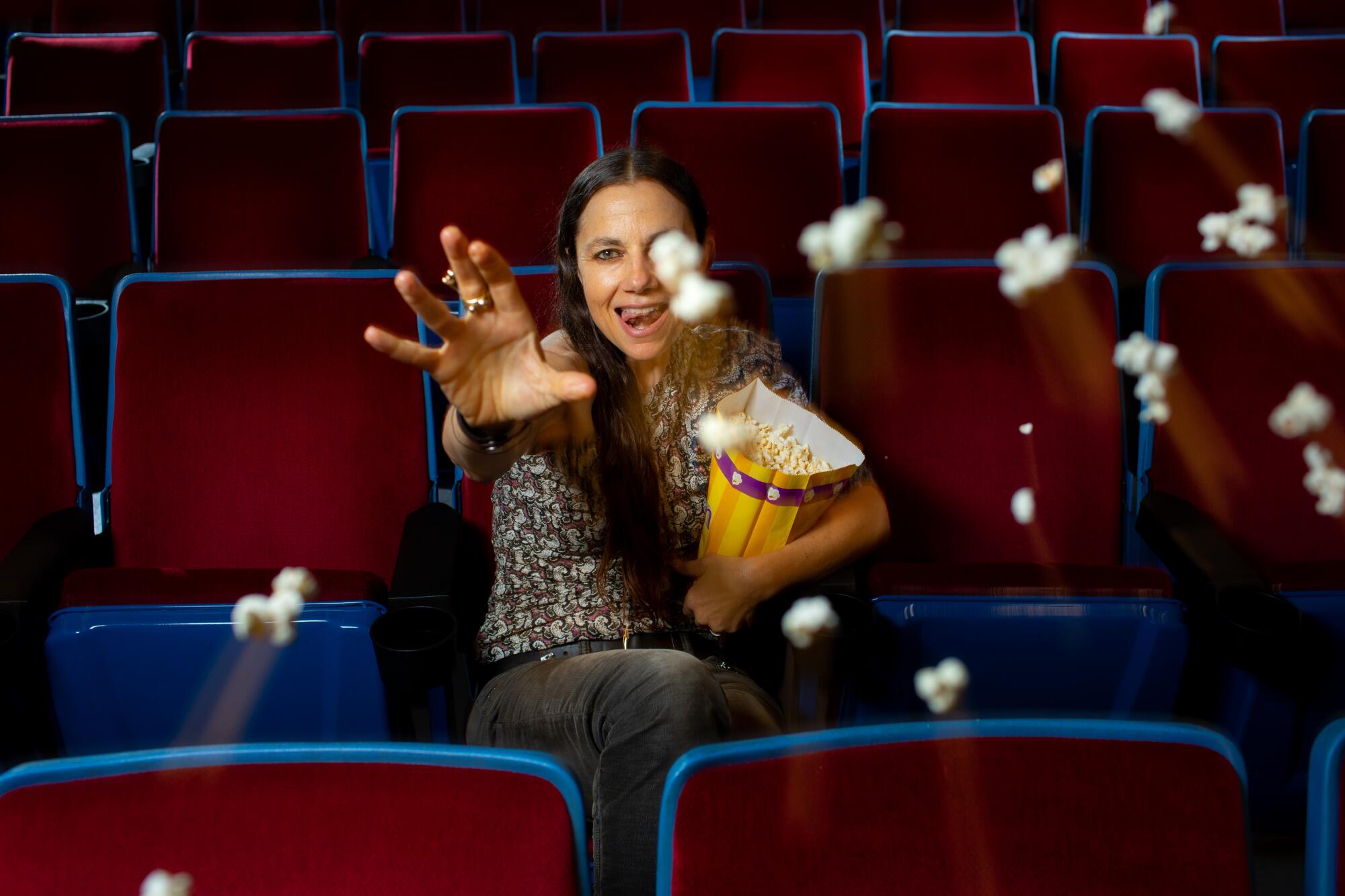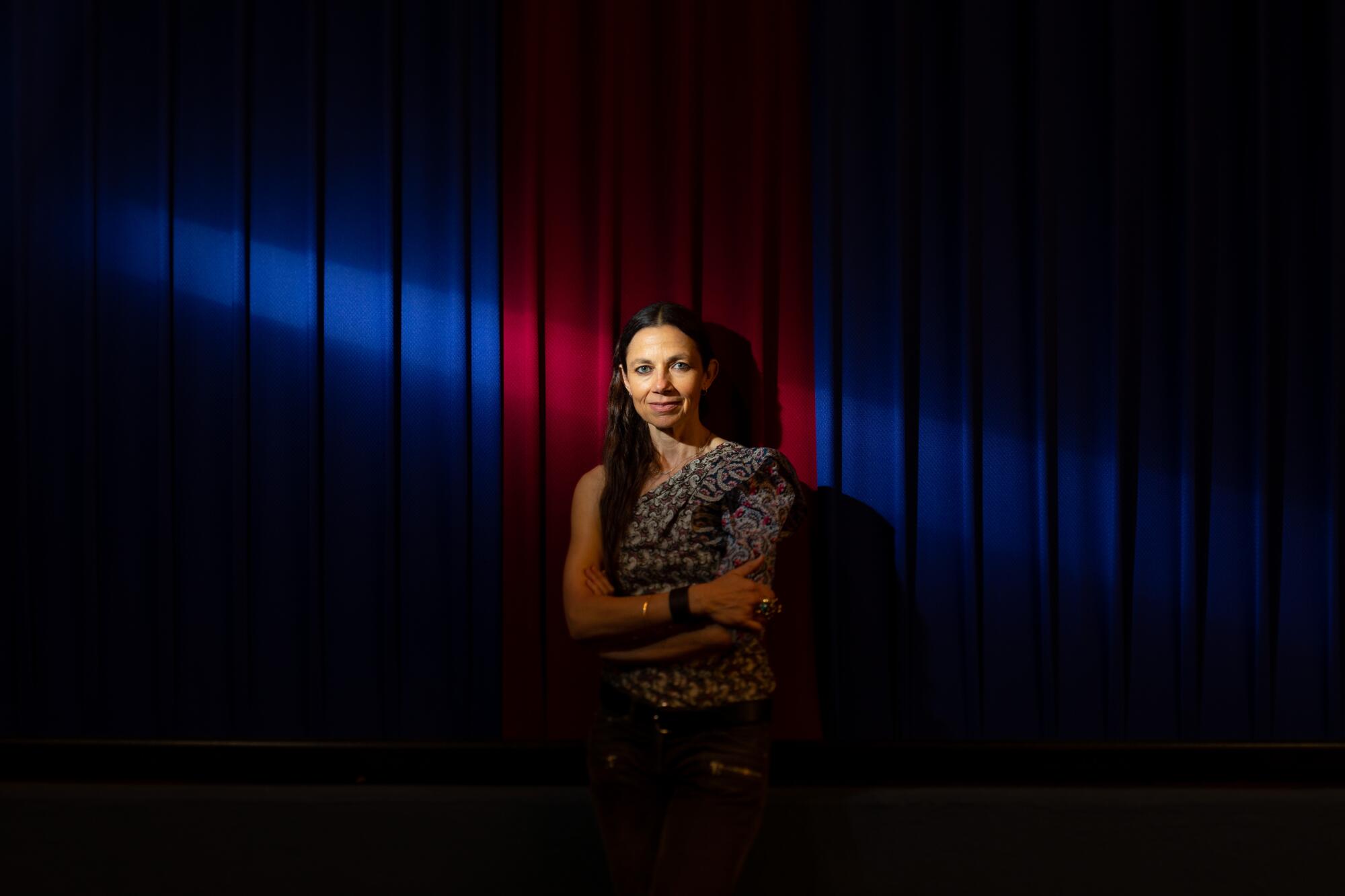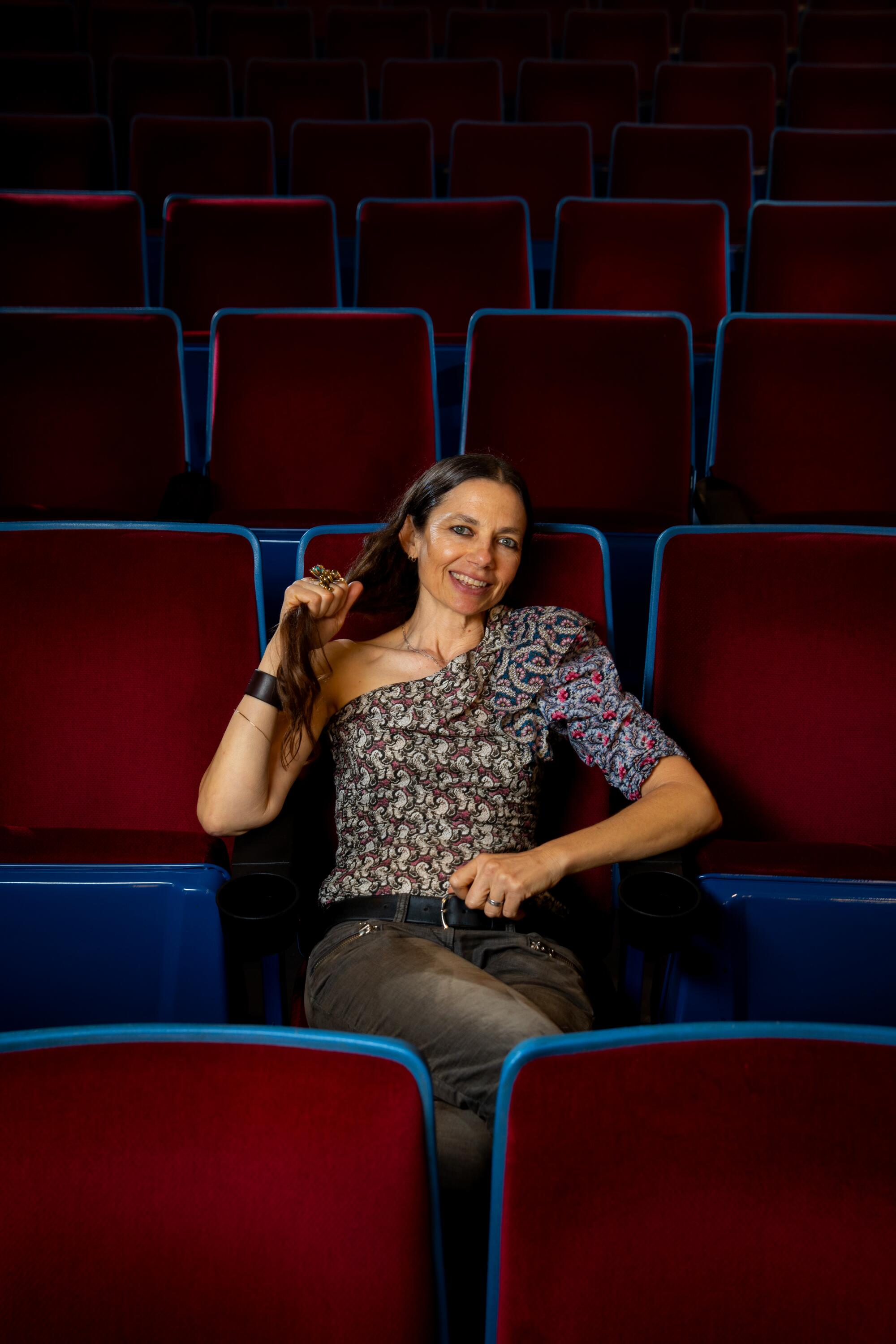
- Share via
When South by Southwest got canceled last year, Justine Bateman was furious. At 54, she was preparing to head to the Austin, Texas, festival for the premiere of her directorial debut, “Violet.” She already had her outfit picked out for the red carpet, had thought about the distributors she was hopeful would bid to release the independent film. She’d even started doing press on behalf of the project — opting to do an interview with The Times at the New Beverly Cinema, unaware that days later the movie theater would be forced to close indefinitely.
But after SXSW’s March 2020 cancellation — the first in-person film festival of dozens that were scrapped or postponed last year because of the COVID-19 pandemic — Bateman didn’t know what to do with her anger.
“Nobody wants to hear about it, because they’re all focused on their fear of dying in the next few months. You’re just alone with rage,” she said, checking in over the phone 12 months after the cinema meet-up. “Everyone’s like, ‘Nobody cares about your movie right now.’ You can imagine all the lead-up — you write the script ages ago, get the film done, get it into a film festival — yay! — there’s all this promotional material made and hotel reservations and outfits and a celebration planned. I was frustrated.”
It had also taken decades for Bateman to arrive at filmmaking as a career. At 16, she was cast as the prototypical ’80s material girl Mallory Keaton on the sitcom “Family Ties.” But after her seven-year run on the series, she struggled to find her place as an actress in Hollywood. So she began exploring different avenues in the entertainment industry — writing for television, working at an internet content production company and launching a digital media consulting firm. In 2012, she enrolled at UCLA, where she studied computer science. Five years later, she wrote her first book, “Fame: The Hijacking of Reality,” an exploration of why our culture puts so much value on being famous.
Along the way, she’d also been writing dozens of screenplays. “You write the script and put it in a bag, not knowing when it will be pulled out and used,” she explained. “Directing is something I’ve wanted to do since I was 19, but I never felt the timing was right. I knew if I did, I would make a pile of junk. The great thing about putting all that work into a script is that it doesn’t decrease in value when you drive off the lot. All that work remains in there.”
“Violet” first came to her in 2011. It’s the story of a 30-something film executive whose self-doubt — an abusive inner-voice narrated by a man — threatens to jeopardize her success in the business. Olivia Munn stars as the lead character, with Justin Theroux voicing her hidden insecurities. The movie will have its second chance at SXSW this week, premiering during the all-virtual version of the festival.

Cassian Elwes, who served as an executive producer on “Violet,” said he urged Bateman to stick with SXSW despite the yearlong delay.
“I’ve been talking her down off the ledge now for a whole year, waiting for this opportunity again,” he said with a laugh. “It’s been hard, because you just kind of say, ‘What do we do?’ And I said ‘We’ve gotta wait for this opportunity again. It has to come back full circle.’ Other festivals have subsequently wanted to have us, but I just felt like there was some kind of karma to it.”
Bateman — who said she spent 2020 “writing four scripts, knitting 12 sweaters, going on 300 dog walks and baking 20 loaves of sourdough” — admits she’s still bummed she won’t get the in-person festival experience. She also has strong feelings about the way the COVID-19 pandemic was handled: “There was lots of fear-mongering, which I think is a horrible, horrible thing to do to people. I think not panicking and taking a breath can go a long way, and the reaction would have been different if there hadn’t been so much political use for it all.”
Still, she’s excited to see who’s interested in acquiring “Violet” — mentioning both streaming outlets and companies focused on theatrical releases as potential partners. In two interviews — one in-person, one via telephone — held a year apart, Bateman shared her hopes for the film, her thoughts on aging in Hollywood and her unconventional take on sexism.
You directed “Violet” almost a decade after writing it. Why?
I got to a point where I felt like, “Oh my God, this is never gonna happen.” When I was [at UCLA], I started thinking: “Will I be on my deathbed and go, ‘I wish I had directed?’” I never want to regret not doing something because I was afraid. Be afraid, that’s a fine feeling to have, but then just go do it. So I started thinking, “Well, what next step would I take if I was going to go do it?”
Violet has a number of negative experiences in the entertainment industry. Is her story based on your own?
This is not autobiographical at all. I wanted to make the character aspirational. Many people want to live in L.A. She works in the film business and she’s beautiful — things people see as a pinnacle experience. So if that person is wracked with fear and afraid to move forward, then it helps other people to go, “Oh, well it’s OK that I feel like that.” I didn’t want somebody to be able to say, “Oh, who could blame her feeling down on herself? Look at the situation she’s in.” Her exterior does not at all match her interior. There’s no explanation for that except that she’s being attacked by her own thoughts.
What were some things the negative voice in your head used to tell you?
I was acting, and this was back when TV movies were a thing. I got a CBS TV movie offer. I didn’t particularly like the script, and I didn’t want to do it. And somebody — I won’t say who — that was within my representation at the time said “If you don’t do it, CBS will never work with you again. They’ll blackball you.” And I thought, “Wait, what?” Part of me was like, “Oh my God, this person must know, there must be some validity to that and I am just not aware.” But I just didn’t do it. And two weeks later, they offered me something else.
Why did you decide to quit acting?
I acted for many, many years, and it was great to me. My career was much longer than most people have. When I started producing digital media, it felt like this was what I was born for. But at the same time, I felt like, “Oh, I’m an actor. I’m gonna keep doing this, of course.” And for five years — I’m not exaggerating — I auditioned all the time and did not get one job. All the acting jobs I did during those five years — which were not many — were friends, like Marc Cherry hiring me on “Desperate Housewives.” I’d never experienced anything like that. I feel like the door had to shut so hard on me so that I could wind up where I needed to be.
One of the first events shut down due to the pandemic in 2020, the South By Southwest Film Festival goes virtual for its 2021 edition.
Do you see “Violet” as a commentary on #MeToo, given all the discussion in recent years about male-dominated spaces in Hollywood?
If someone wants to talk about how it could be topical like that, I think the film shows the next step. Like if a woman says, “Oh, I feel uncomfortable raising my hands in meetings because I feel like it’s a toxic male environment. I feel like my ideas won’t be received, so I don’t even speak up in meetings.” I want to say to them: “Let’s go back to the moment you had an idea in a meeting. You had the thought: ‘I don’t want to raise my hand because they’ll think I’m a bitch.’ So really, you didn’t raise your hand because you’re people pleasing — because you’re afraid they’ll think you’re a not nice person, which may or may not be accurate at all.”
So to turn around and say it’s because it’s a toxic male environment? I feel like that’s entirely unfair to the office you’re in and also unfair to yourself. What if you’re holding yourself back? Not what if you’re the problem — I don’t mean it like that. You could be in a toxic male environment. But so what? And if somebody says “I’ve raised my hand a number of times and nobody will listen to me.” OK, then maybe there’s an opportunity to go to another company .... I’m just saying: Look at the moments where we’re making choices or not making choices because we’re afraid. If you can eliminate those, or go do the opposite, where would you be professionally or personally?
Does that mean you think the claims about toxic masculinity in the industry have been overblown?
I don’t like to make blanket statements about guys. Because I really love working with guys. I’ve only ever had one questionable situation in all my years in the business — a director said something to me, and I walked up to him and said “You can never ever say anything like that to me again.” And he goes, “Oh, yeah, sure, OK.” I was like, “Great, we’re fine” But that’s just my experience. I love working with guys. I frankly love being in situations where it’s mostly guys professionally — maybe because that’s mostly what I’ve been in. I feel like if anyone treats me strangely or treats me in a sexist way or something — look, I know this isn’t politically correct — I don’t really give a s— about sexism in my life.
You don’t believe in sexism?
I don’t care about it. As a woman, I don’t want special treatment. I’ve never thought “I didn’t get that opportunity” or “I’m not in X situation” because I’m female. I would never entertain that. Go be sexist. ... If somebody behaves in a sexist way towards me, it’s like I’m playing a poker game with them and they’re showing me their hand. And frankly, if I’m gonna do business with them, I know exactly how to take them down. If it’s a situation where that causes them to not hire me or something? A, I just dodged a bullet because I really don’t want to work with a lot of insecure people. And B, I’m gonna get where I’m going, and he’s just a rock on the hill. I’m water, I’m just gonna go around him and get somebody else to say yes.
But do you think everyone is in an equal position to handle that kind of adversity?
Let me put it this way: If I can’t handle that, how am I as a director gonna handle a film set? I’m not making a blanket statement about other women’s experiences, this is just mine — every experience I have like that, every person who has said no to me, every person who has been odd to me or tried to play mind games with me — all of that is training. So the second time some other person comes at me the same way, I have practice at that. So if I get on a set and somebody starts f— with me like that, I can squelch it and make sure my set remains a great place to work.

In April, you have a collection of stories coming out — “Face: One Square Foot of Skin” — about women and aging. What inspired you to write it?
Yeah, it’s about women’s faces getting older and why it pisses people off. Would I have been able to write that book if I hadn’t been bashed online to s— for my own face? Was that a f— up situation to go through and really messed with my head? Yeah. It was hardcore, real-time inception. I let it gaslight me. I really did. If there’s something about me that I can’t change and this is me — my gender, my face, my height, my body type — it’s better if I get my head straight about it, because then I’ll be bulletproof. I was just starting to get things around my mouth and my eyes and now it’s deeper, so how f— would I have been if I just went along with it? They’re wrong, and I’m right. I look awesome. If I’m the only person that thinks that, I don’t give a f—.
See, that’s my position. I feel like there’s a lot going on right now where everybody wants everybody else around them to change. Should people not be racist or sexist? Yeah, sure. But I have this much time on Earth. I don’t have the energy or time or money to change all these people. What I can do is make myself the kind of person who can be in those types of situations and have it just not affect me at all.
What are your thoughts on plastic surgery? Can it be empowering?
I don’t find it empowering to females at all. Listen, it’s great if they feel that way. But empowering to what? Who did you just make happy? Am I doing this because I want to make sure I don’t want to get criticized? If trolls are coming for those actresses, how much would they come after somebody who is more normal? I think for the most part that is what is fueling people’s desire to change their faces — the fear of being criticized.
Do you hope to keep directing?
I definitely want to die on a set. I want to do this until I die. I want to create a respectable financial track record so I can keep funding my films. ...As far as shooting under [COVID-19] protocols goes, I really dock my hat to anyone doing it right now. The kind of set I like to run — the relaxed way I like to do things — I think I would just be irritated with wearing a mask all day and having to keep distance from particular people and some COVID officer telling them what equipment they can touch. Some of that is a little nonsensical.
More to Read
Only good movies
Get the Indie Focus newsletter, Mark Olsen's weekly guide to the world of cinema.
You may occasionally receive promotional content from the Los Angeles Times.











